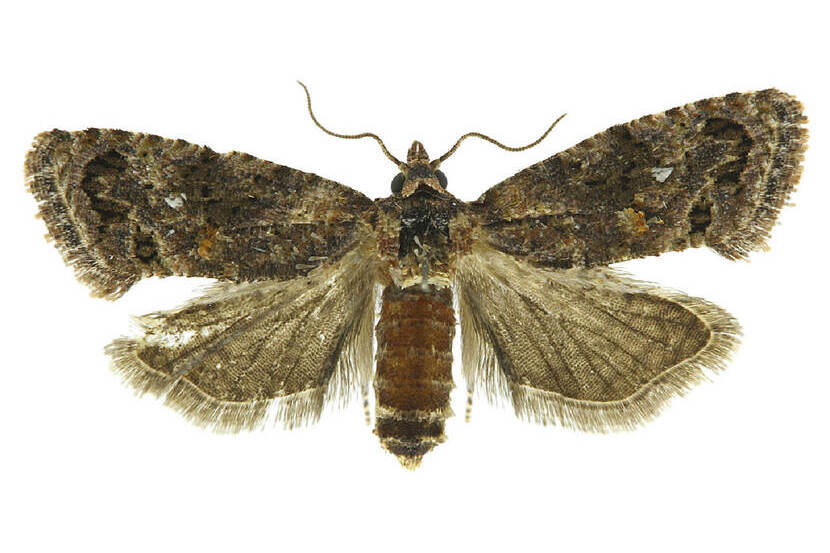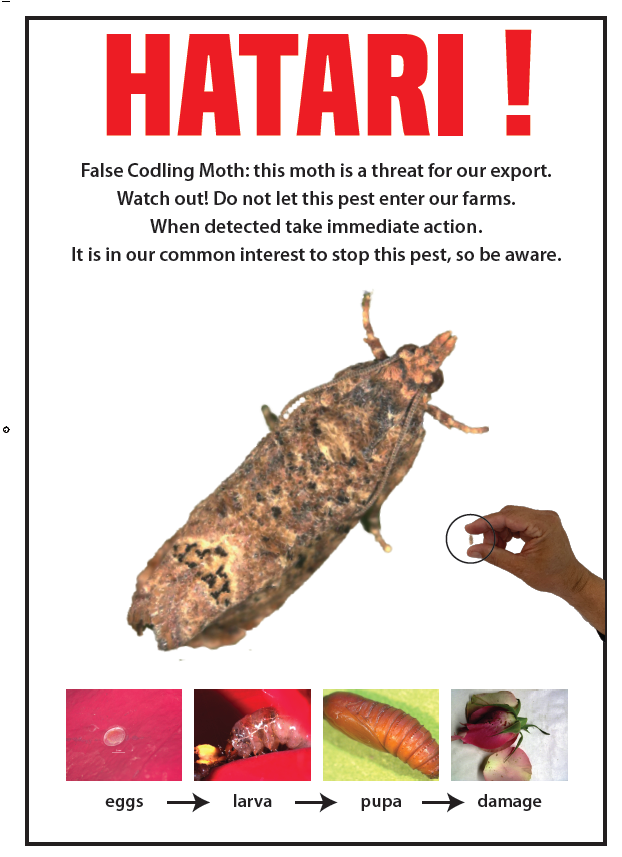Rose farmers in Kenya watch out! The False Codling Moth could stop the export of roses to the EU
The False Coddling Moth (FCM) is posing an increasing threat to the export of roses from Kenya to the Netherlands. Despite efforts of farms, the Kenya Plant Health Inspectorate Services (KEPHIS) and other stakeholders like KFC, FPEAK and FPC, FCM is still being detected on a regular basis. As interceptions of roses with FCM are deemed too high, the EU is now considering increasing the amount of inspections. In 2019 the frequency of inspections already increased from 5% to 10% this may now rise even further. Increased inspections have large consequences for Kenyan rose farmers in terms of costs, time and their competitive position. Moreover, continued interceptions will affect the Kenyan export sector as a whole. To mitigate this risk KEPHIS has increased its measures with respect to production and export of roses in Kenya.

Action is needed now!
Measures which flower farmers are currently taking are not enough. FCM is still found too often. If interceptions stay this high the EU could increase inspections again and again. Tanzanian roses currently already face a 50% inspection rate for FCM.
Clement Tulezi (CEO of KFC): “70% of our produce goes to Europe. Anything that happens in Europe has a direct and immediate impact on what we do.”
Due to the continued interceptions, the EU discussed in March to review the amount of inspections as there has been insufficient improvement of FCM interception on roses. To avoid this KEPHIS announced an online meeting with stakeholders to mitigate the effects of FCM. During this meeting various measures were proposed that included management at production sites and introduction of more stringent measure upon interceptions. An increase in inspection would lead to an increase in costs and possibly cause delays due to the high volumes which need to be inspected. It is now up to the farmers to show they can decrease FCM on their farms.
Apart from KEPHIS there are also various sector organizations working on the issue. The Kenya Flower Council (KFC), Fresh Produce Exporters Association of Kenya (FPEAK) and Fresh Produce Consortium (FPC) with support from Europe-Africa-Caribbean-Pacific Liaison Committee (COLEACP) are at the forefront of addressing the False Codling Moth. According to Clement Tulezi (CEO of KFC): “We are planning to train 20 farms which have had repeated interceptions using the joint FCM protocol over the next 3 months.” This is important as “70% of our produce goes to Europe. Anything that happens in Europe has a direct and immediate impact on what we do.”
FCM, KEPHIS and the EU
The False Coddling Moth (Thaumatotibia leucotreta) is a threat to many flowers, fruits, vegetables and other crops. Because of this, in 2017 FCM was given the quarantine status in the European Union (EU). Currently European countries are therefore obligated to inspect 10% of the roses for FCM coming in from Kenya. The EU sets the percentage of inspections based on the amount of quarantine pests found, of which one is the FCM. The Netherlands is by far the largest importer of roses from Kenya. Increased inspections will thus affect the trade flow between Kenya and the Netherlands.
The Kenyan National Plant Protection Organization (KEPHIS) has in the past implemented various measures to ensure compliance. Measures include farm inspections and trainings in the identification of this pest, as well as engagement of business owners. As Kenyan roses continued to be intercepted, the EU decided in February 2019 to increase inspections for imports from 5% to 10%. In 2019 KEPHIS, the Kenya Flower Council and the Netherlands Government therefore joined efforts and trained inspectors and scouts, as well as rose growers. You can find a link to the full article on the trainings, including the presentations that were given to stop this pest in Kenya here.

Why does the EU inspect incoming roses?
The EU aims to stop the introduction and spread of new pests and plant diseases, thereby reducing or eliminating the economic and/or environmental impact of the harmful organisms and reducing the need for pesticide use. To avoid pests and diseases entering the EU the National Plant Protection Organization of a country has the obligation to provide a phytosanitary certificate. This guarantees they have been properly inspected, are free from quarantine pests and are in line with EU plant health requirements. Once arrived in the EU a certain percentage of the import is inspected again. The percentage of inspected goods depends on the amount of previous interceptions and is increased if this is deemed too high. The Netherlands Food and Consumer Product Safety Authority (NVWA) and the Quality Control Bureau (KCB) are responsible for the inspections in the Netherlands.
The economic impact of roses
About 2 billion roses are exported from Kenya to the Netherlands where they are sold at the flower auction and flower importers. Kenya supplies one third of all roses sold in the EU. Cut flowers are Kenya’s second largest export after tea, contributing around 1% of the country’s GDP. They are also one of the country’s largest sources of employment, with over 200,000 people working directly in the flower industry and an estimated 4 million indirectly.
The Netherlands Ministry of Agriculture, Nature and Food Quality (LNV) realizes the importance of the agricultural trade between the two countries. The Netherlands and Kenya therefore have an Agricultural Working Group in which, among other issues, threats are discussed. One of the topics of discussion is the FCM. In the past this has led to a number of trainings provided by the NVWA and KCB to KEPHIS inspectors. To further assist rose growers to identify the pest on their farm we have designed a poster which farmers can print to train their personnel and increase awareness. The poster as well as training materials by the KCB and NVWA on identifying the pest can be found here.
For more information about the trainings or the False Codling Moth or in case of questions for the Agricultural Counsellor feel free to contact us via nai-lnv@minbuza.nl. For the latest updates follow us on twitter @NLAgriKenya or register for our newsletter by sending an email.